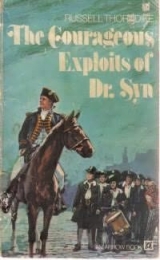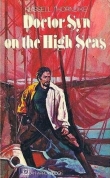
Текст книги "The COURAGEOUS EXPLOITS OF DOCTOR SYN "
Автор книги: Russell Thorndike
Жанр:
Исторические приключения
сообщить о нарушении
Текущая страница: 12 (всего у книги 16 страниц)
11
THE CURSE OF ALDINGTON KNOLL
Above the wide extent of Romney Marsh, that pleasant territory reclaimed from the sea by wall and dykes, and but a
few miles inland, stand two grim sentinels upon the old coastline cliffs. One is Lympne Castle, growing from the
hill into a man-made high-perched cluster of fortifications, and the other Aldington Knoll, a naked hump of nature
from whose grassy summit can be obtained a far-flung view of Marsh and Channel waters. An advantageous spyglass look-out if ever there was one.
No wonder that there existed round it a local legendary curse proclaiming that should the Knoll at any time be
leveled, it would bring a grave disaster upon shipping.
The reverence and awe attaching to this curse was well supported not only by navigators who used its sky-backed
prominence when taking bearings, but by generation of smugglers who had ever availed themselves of the mound
for signaling with flashers and beacon when giving orders to their incoming luggers.
The hill being privately owned for grazing purposes was often threatened by would-be levelers, and the
Scarecrow, whose men used it to such good advantage, saw to it that any attempt at its removal by its owners should
be met with the stoutest opposition.
Now in the days when Doctor Syn ruled the spiritual good of the Marsh, and the Scarecrow dominated the evil
upon it, a certain Farmer Finn, inheriting the land from his father, became one of the most powerful holders in the
district.
Full of energy and with a passion for farming he disregarded the local superstition by announcing his intention of
leveling the Knoll in order to improve his cultivation.
A storm of protest arose when his word went out for labour. The local men of Aldington would not touch it.
Even those who worked on his land refused the task. Posting notices, distributing leaflets, sending out criers; all
these methods brought no response. Not an ablebodied man from Lydd to Dymchurch would volunteer.
Doctor Syn who liked to keep in touch with all events connected with the Marsh, rode over to Aldington to visit
Farmer Finn. He found him in an angry mood. Why, he demanded, should he be boycotted by local labour? He
would show them that they could not dictate to him in a matter concerning his property. He was aware that the work
was hard, but had he not raised the rate of pay to nearly double the amount which anyone else would offer? The
right of way over the top would save pedestrians a stiff climb if the Knoll was level ground. Knowing that the
height was used by the smugglers, he railed against the authorities for not having laid the Scarecrow by the heels. It
was obvious that this same Scarecrow must have issued a manifesto that the work should not go forward.
“I think it goes deeper than that,” suggested Doctor Syn. “You may scoff if you like, but people who live on or
about the sea are superstitious as a class, and you know the ancient curse that some say was laid upon the Knoll by
the Holy Maid of Kent.”
“Aye, I know she was a local celebrity in the days of Henry the Eighth,” sneered the farmer, “but she went to
death at Tyburn, a confessed fraud. Besides, I doubt very much whether it was she who uttered this ridiculous curse.
More likely some scoundrelly smuggler-chief , like this Scarecrow, who finds it so useful. If bad luck comes of its
removal, no doubt the ill-fortune will be mine to bear.”
“The labourers you have approached evidently fear the curse will fall on them,” said Doctor Syn.
“Well, I can tell you this, Reverend Sir,” replied Finn. “The Knoll goes down with their help or without it. I can
import men from another district, who will be glad enough to earn good money.”
“But there is another point about this vexed question, which you may not have considered,” went on Doctor Syn.
“Indeed I made this journey on purpose to discuss it with you. Captain Blain, who as you know is in charge of the
ferreting out of smugglers, and is staying at my Vicarage, informs me that the Knoll is given some importance upon
all Admiralty charts of the Channel coast. Now I know something of the Law, and realizing the power of the Naval
fellows in London, I should advise you to examine your ground very thoroughly before removing it. I mean it
would be a vast expense and trouble if they made you put it back again, if you get me?”
“You can take it form me,” retorted Finn, “that once the Knoll is down the expense will be theirs, since they will
have to alter the existing charts. I know something of the Law too, and the most jealousy guarded rule of England is
that an Englishman may do what he likes with his own. The Knoll is mine and I shall do what I like with it. Have
you any objection, Reverend Sir?’
“I should be sorry to see it go, I confess,” replied the Vicar of Dymchurch. “It is a pleasant spot to look at in fine
weather, and in foul, why, it is pleasant to think of it as a safety guide to homing sailormen.”
“Well, I am afraid both you and the Scarecrow will be disappointed by my action,” snapped Finn.
“You may associate me with the scoundrel, if you please,” said Doctor Syn. “But you must agree that our
motives in this case of sane thinking are entirely different. His are selfish, while mine are altruistic.”
“I have no wish to quarrel with you, Doctor Syn,” replied Finn, more kindly. “You are an honest man, I know,
and try to see things from other people’s point of view. Therefore you are the only one I shall regret hurting when I
pull down the Knoll. And, by the way, I wonder my ancestors have not been at it before me, for the antiquaries say
that the mound on top is man-made: either Druid or Roman, and inside it there may be all manner of buried
treasure.”
“At least such discovery would go a little way to compensate us for its loss,” said the Vicar. “But I do urge you,
once more, to make sure how you stand with the Admiralty.”
“Damn the Admiralty,” exploded Finn. “Anyway, I am going to pull it down, and if needs be apologize for my
act afterwards. I can at least give them the excuse that the Knoll is mine and not theirs.”
Returning to Dymchurch the Vicar let Captain Blain know of Farmer Finn’s attitude towards the Naval Rights,
and when his guest had retired to bed saying that he would send a report the next day to Admiral Troubridge at the
Admiralty concerning Finn’s attitude, Doctor Syn admitted Mipps to the study, where, over a bottle of the best
brandy, the two rascals put their heads together in order to find the best way in thwarting Finn’s design.
Determined to carry out his project without further delay, Finn sent up into the weald of Kent for laborers. Here
he was equally unsuccessful, for his agents found that the Scarecrow had been word-passing before him, instructing
his agent in every village to let it be known that it would be highly dangerous for any man to accept Finn’s offer of
work.
Only one man disregarded the warning, and Finn welcomed him with open arms. A man of gigantic strength,
Knarler had been a slaughterman at Cranbrook, but had been discharged from his post for cruelty. He was the type
that Finn needed. A man not to be bullied by the local opinion against him, for he assured Finn in the strongest
terms that he feared neither God nor man, and had no terror for old curses. He even expressed the hope that the
scarecrow might oppose him in person so that he could knock him out and carry him before a Justice of the Peace.
“For I can do with that there reward upon his head,” he laughed.
On inspecting the Knoll he assured the farmer that although he could do it singlehanded, if need be, it would take
some time. Indeed he planned to make the job as long as possible, since it was double money an hour.
Needing money, Finn allowed him a little in advance, so that he could refresh himself at the ‘Walnut Tree.’
The landlord of the inn, however, happened to be the Aldington agent for the Scarecrow, and told Knarler plainly
that strangers were not very welcome by his patrons.
Knarler pointed out that so long as he kept sober and paid his way no landlord could refuse him service.
Shunned by the villagers, s though he had the plague, Knarler thought of a good way to retaliate. He went to his
employer and asked for authority to make Finn’s tenants help in the work.
“I tell you they are stubborn, and will neither be persuaded nor compelled,” replied Finn. “Besides, they are
afraid of the Scarecrow. That’s obvious. They will refuse.”
“Not is you give them notice to give up their cottages,” laughed Knarler. “If I begin throwing their furniture,
women and children into the village street. You own the cottages and there would be no shelter for them. That
would make their men work, and under me, as your foreman, they’ll work hard.”
To do him justice, Farmer Finn was horrified at the man’s brutality. Angry and obstinate over the whole
business, he would not tolerate such cruelty to gain his ends.
Knarler tried to persuade him to his way of thinking, because he had stupidly boasted of what was going to
happen to the tenants at the inn, and when the farmer’s refusal to this tyranny became known, they would laugh at
him for his failure, and hate him for the instigation of such a plot.
When Knarler first mounted the Knoll, armed with pick, spade and shovel, he was conscious that every eye in the
village was watching him, so to cheat them of a view of his proceedings, he climbed over the summit and started to
work a few feet below upon the sea side. This was also more convenient as Finn’s sheep were grazing on the land
side. One of the Scarecrow’s men was glad of this, since it saved him from a climb and having to bear a message to
Knarler, for his orders had been explicit.
“It is necessary for the Scarecrow’s plan that the cutting on the Knoll shall start on the sea side. Should this
Knarler begin work upon the land side, you will take him orders from Farmer Finn to start on the sea side. As one
of Finn’s tenants and farm laborers, he will not suspect this order as coming from any other than your master.”
For what reason the Scarecrow had given this order the fellow could not guess, but the loathing that everyone felt
for Knarler since his plan of unhousing women and children, made him glad that he could avoid the contact of the
message. Greatly relieved, he left his station at the foot of the Knoll, and went back to the ‘Walnut Tree.’
He found the friendly old bar parlor filled with men discussing Knarler with animosity. They had begun to drink
early because they knew he was away working and that the ‘Walnut’ would be sweet again without him.
“Why trouble yourselves with him?” advised the man who was to have been the Scarecrow’s messenger. “He
can only bring harm to himself by doing work for Finn’s money that is accursed. And we mustn’t blame Finn too
much. He’s obstinate over this, but he’d sooner be paying us his money that him from Cranbrook. At least Finn did
not fall in with his devilry about turning us out under the sky. Finn has too much of his family in him to be a bad
landlord to us.”
“And that’s true enough,” echoed the landlord of the ‘Walnut Tree.’
“And let us not trouble our peace about this Knarler,” went on the other. “He’ll work out his own damnation,
you’ll see.”
Meanwhile Knarler worked on alone, and as he thought unwatched. He was determined to surprise his employer
as to his capacity. At least on the first day of the job. He determined not to return to Cranbrook till he had money
enough to make all envious, and with which to settle old scores. He would make himself a power with this Finn,
and cause the lazy village of Aldington to dance vigorously to his tune. Every swinging stroke of his pick into the
chalk he imagined to be the cleaving of one of their skulls. Cleaning a filled-in pit of old rubbish, he picked out a
large piece of broken pottery. It was the broken portion of an earthenware basin. He flung it vigorously over his
head without looking round though he knew it would fall into the deep ravine behind him, and hoped that it might
land on somebody’s head and knock them senseless. He worked on with pick, spade and shovel. He would show
these lazy ones what work he could do. He had climbed the Knoll with plenty of strong drink and hunks of bread
and cheese. He vowed he would go on till dark.
He kept laughing to himself when he thought of the villagers’ dread of the curse. That sort of nonsense would
not worry him. But some little time after he had thrown away the pottery, he had a curiously uneasy feeling that he
was being watched from behind. He told himself that he was not going to be upset by anyone. Neither was he the
sort of man to get jumpy. So he filled another shovelful and turned to throw it into space. But he did not throw it,
because what he saw so astonished him that he let the load slip from the tool. Close behind him stood a tall blackcoated figure of a man, whose eyes seemed to be piercing his soul, or rather seeking for the soul which he had lost.
In his hands this arresting figure held the piece of broken basin. Knarler told himself that he had evidently hit this
individual with the pottery, and that he had come up as an injured party to protest.
“What do you want?” growled Knarler.
“This piece of terra -cotta,” replied the other in a pleasant voice. “I am quite sure that Farmer Finn will let me
have it, as I think such a relic will not interest him very much. Of course I want to reward you for having unearthed
such a unique piece. See, my man, here is half a spade guinea. You shall have another if you can find the rest of
this.”
Knarler felt nothing but scorn for him now, though at first he had all but been frightened at his sudden
appearance.
“You keep it if you’ve a fancy for broken crockery,” he said. “But make good your promise. Where’s the half
guinea?”
The bla ckcoated one casually tossed a gold coin across to him. It fell on the grass at Knarler’s feet. The
astounded ex-slaughterman picked it up, bit it, and found that it was good currency. Then this mad-brained
generosity made him suspicious.
“Who are you, and where did you come from?” he demanded.
“I climbed the Knoll to see what kind of god was raining such treasures from above,” he replied. “I climbed
faster than my servant who is following me.” He turned and addressed someone over the brink. “Let me lend you a
hand, my good Mipps.”
“I can manage nicely, sir,” grunted another blackcoated man who scrambled up into Knarler’s sight. This
second arrival was a wiry old fellow, who surveyed Knarler critically with sharp eyes.
“I am Doctor Syn, Vicar of Dymchurch, Mister Knarler, and this is my Sexton, Mipps. Look, my good Mipps,
what I have achieved. A most illuminating example of the Roman period.”
The little man looked at it with disgust. “It ain’t much good, sir, surely? It looks to me broke.”
“You keep your trap shut,” warned Knarler. “If the gentleman likes it, what’s that to you? I’ll sell him some
more at the same price. I can do with the other half of this guinea-piece.”
“Half a spade?” echoed Mipps. “And I has to dig graves for a eightpence. Something wrong somewhere.”
“Nothing is wrong,” replied Syn. “In fact, everything is right if Mister Knarler of Cranbrook will only do me a
favour.”
“Mister Knarler of Cranbrook,” repeated the digger. “You seem to have heard about me somehow.”
“Do you know him, sir?” asked Mipps.
“I do, I do,” went on the Vicar with enthusiasm. “He is the man who can remove mountains, and make rough
places plain. Mister Knarler, you can help me, and then yourself to some more of my gold.”
“Let’s have it, and tell me what,” said Knarler.
“This find from Roman days,” whispered the Vicar, “is but the key to further treasures of equal value. If you will
only dig as I ask you, how rich you can grow.”
“I has to dig the lot away, so may as well clear the bit you want done first.”
“I knew I should like you, Mister Knarler,” laughed the Vicar. “They tell me you have no fear of this Scarecrow
that has banned the moving of this hill. Well, I applaud your courage. I attack the Scarecrow, too, don’t I Mipps?
Yes, Mister Knarler, I preach against him from my pulpit.”
“And me always telling you not to, too,” put in Mipps.
“Now see her,” continued the Vicar. “This piece of pottery is part of a military wash pot. Finding it in the
hollow there, tells me that in the face of the cliff behind it here we shall uncover
the remains of a Roman captain. Clear all this grass, Knarler, and then cut the chalk into a level face. I have no
doubt but that we shall find a tomb. All sorts of things buried with him. Sword, buckler, his personal properties,
like wine flagon, milk-jug”
“And the rest of the wash-pot?” suggested Mipps.
“I think not, Mipps,” corrected the Parson. “That should be where this piece came from, at his feet. He will be
buried standing to attention. How splendid. If Mister Knarler works hard we shall see a dead man upon the face of
the chalk. I will pace out where you must dig. From here to here. Show me a nice white face of cliff, and then Ill
come along and help you. We’ll have a corpse to show for our pains. Work well, Knarler. I fear I must leave you
now for my duty. Clear the chalk, my good man.”
“I will, and you of guineas, too, I hopes, sir. If his milk-jug’s there, you’ll have it and the rest of the wash-pot,
too.”
They left him hard at work.
Out of sight and at the bottom of the Knoll, Doctor Syn mounted his fat white pony that had been peacefully
grazing. Mipps followed suit upon the churchyard donkey. As they rode off at a walk Mipps saw the piece of
pottery that had cost his master half a guinea.
“Wait, sir,” cried Mipps. “you’ve gone and dropt your wash-pot. I’ll pick it up.”
“Not worth the carrying,” replied Syn. “Nothing Roman about it. Modern. Dumped there not more than a year
or so.”
“Then why pay gold for it?” whined Mipps.
“Because, as you know, the Scarecrow pays well for any work he wants done. And he happens to want a white
facing of chalk upon the sea side o f the Knoll. When that is done the work must be stopped, as we agreed it must be
stopped. It is only that I have changed my plans slightly. Ride close beside me and you shall hear.”
Meanwhile Knarler worked on feverishly, determined to find the Roman captain and his belongings that very
day. The crazy Parson would pay him well. If not he would smash up such treasure as he found under his eyes
unless the pay was double. The Parson would fall for such a threat. Although he did not waste time in eating, he
constantly fortified his strength with copious gulps of spirit. By the time the sun set in Fairlight Bay he was drunk.
But he worked on, eyeing with pleasure the growing whiteness of the uncovered chalk. At twilight the Parson
visited him, and after congratulations, encouraged him to go on.
“Plenty of time,” growled the exhausted drunkard.
“But there is not,” contradicted the Parson. “Farmer Finn had had a message from the Admiralty warning him to
allay proceedings till Whitehall has looked into things. I had this from Finn himself. He is still obstinate, but their
appeal to his loyalty has weakened him, It is not-pleasant to do a disservice to your country, and this landmark is of
value when we are at war with the French yonder.”
“Don’t fret, sir,” chuckled the digger. “I’ll get that Roman before downing tools.”
When Doctor Syn had gone, he drank more and worked harder. As the darkness deepened and the red in the west
faded into black, he vowed that he’d work on in the gloom till the moon rose over the sea to give him light. As the
Marsh turned black beneath him he quite welcomed the scattered little lights that began to twinkle up at him from
distant farms and cottages. Ship’s lanterns, too, moved slowly out on the dis tant fairway of the Channel.
He felt angry with himself for being capable of feeling lonely. He longed to see even the scowling faces eyeing
him under the lights of the ‘Walnut Tree’ snug parlour. So he drank more till he glowed inwardly into a savage
rage. Then his inflamed brain played tricks with him. It was not the sheep, for they were huddled together at the
foot of the Knoll. Once he imagined that he saw horsemen below him on the level whose faces shone pale as they
galloped. Cursing himself for a fool, he faced the whiteness of the chalk: drank deeper and worked on, his legs
frequently giving under him as he swung his pick with greater effort. The moon would soon be up, he told himself.
Meanwhile, at the Vicarage of Dymchurch, Doctor Syn expressed mild surprise when his guest, Captain Blain,
refused to linger over the port. His Bos’n was awaiting him, and he must go at once, he explained.
“Is it that you have heard rumours of a ‘run’, Captain?” asked the Parson anxiously.
“No, Doctor Syn,” replied the Captain. “But I am taking no chance of losing a sight of the Scarecrow, and since
he is so hot against this removal of the Knoll he may take steps in the matter. I think he may be attracted to the spot.
The moon will rise. I shall hide and through my spyglass get a view of him perhaps.”
The moment he had gone, Syn summoned Mipps from the kitchen.
“Just as I guessed,” he whispered. “The Captain has gone with the Bos’n, and I can play my prank on him and
punish this interfering Knarler at the same time. Is all ready?”
Mipps held out his left hand, began counting off items, “Strong rope attached to a sea-saving belt. Four lengths
of thin cord. Two for arms. Two for legs. And we both knows the naval semaphore code. We’ve only to go.
Jimmie Bone is waiting for us with the horses and things, and the other lads at Aldington.”
When the moon rose Captain Blain saw a strange sight upon the Knoll. Against the whiteness of the new-cut
chalk stood out the black figure of the Scarecrow.
“Look,” he whispered to the Bos’n. “He’s doing it again. It says”—slowly he spelt out the sentence—“THE
SCARECROW FORBIDS FURTHER DESTRUCTION TO THIS KNOLL. And look at him now. If he ain’t adoing it with his legs. Look, he’s dancing it out, sir. Same message. He’ll be doing a hornpipe next.”
“Come on, Bos’n,” whispered the Captain. “We’ll be taking a closer view.”
Had the Captain been on the top of the Knoll, he might have heard whispered orders of: “Right, Right. Now
again. Same order.” But when he stood peering over a ledge and looking up at the Scarecrow he heard nothing.
The Scarecrow, hideously masked, was standing against the white cliff and seemingly looking out to sea. The
Captain then acted on the instinct that he might never have such another chance again. He drew his pistol and fired.
There was a gurgling choke, and then four cords slid down across the face of the chalk and the ends trailed on the
grass.
Come on, Bos’n. He’s not standing on a ledge. He’s hanging by a rope. Yes, from above. They’d let him
down, and look, there’s cords to his wrists and ankles. Up aloft we go.”
When they reached the top they saw that the rope was fastened round the beacon post. There was no sign of
anyone about, though the sound of galloping horses came up from the road beneath.
“We must have a look, Bos’n,” said the Captain. “Lower him down, eh?”
they lowered the heavy weight to the ledge below, and then examined the features under the mask.
“I killed him. He’s dead all right. Still warm. Is it the Scarecrow?”
The Bos’n shook his head at the Captain’s query.
“No, sir. I’ve seen this cove. You ain’t. It’s Finn’s man what was to level the Knoll.”
Doctor Syn had just time to get into bed and blow out his candle before he heard the Captain return with the
Bos’n. He heard him unlock the door below and tell Bos’n to wait. He then crept up the stairs and knocked on the
Vicar’s door.
As he told Doctor Syn the next day, it was the first time he had ever sought out a priest for confession. When he
had told the whole story, he put his case before the Vicar in this way. “No one but the Bos’n knows of this. Even
the Scarecrow’s men who were obviously using this unfortunate scoundrel for their jest, and pulling his limbs this
way and that in signals, will be wondering who fired the shot. Now if I confess, it will mean me being called for an
Admiralty enquiry. I may be dismissed the service for rashness, though I think not, but I am sure to be taken from
here, and, Doctor Syn, I want nothing to prevent me from catching this Scarecrow eventually. Can I in honour keep
silent? I ask you as a wise man.”
“My good Captain,” replied Syn, “if we three keep silent the blame will fall on someone unknown who wished to
prevent Farmer Finn from destroying our Knoll. The Scarecrow will no doubt be blamed. Well his crime-laden
shoulders seem broad enough to bear another murder. Say nothing about it. Captain blain, if you leave us, we shall
never catch the Scarecrow. Let us say no more, but make a compact that come what may we will work together to
rid my beloved Marsh from this evil that rides by night.”
“Thank you, Doctor,” replied the Captain fervently. “Yo u have given me a great relief. In return I will give you
my full confidence. Perhaps I have kept you too much in the dark up to now, in spite of all your kindness. But this
helpful act of yours makes me not only an obligated friend, but a sworn ally.”
“Against the Scarecrow,” completed the Vicar, nodding his tasselled night-cap. “Oh, Captain, do you think we
shall ever unmask him? Do, do let us try.”
Syn and Mipps chuckled next day when Finn rode over and said he repented he had ever gone against the Vicar’s
advice.
They chuckled more when they realized how well the plan had succeeded, for where Knarler had digged the
chalk became in sunlight of moonlight a pilot light across the fairway of the Channel.








